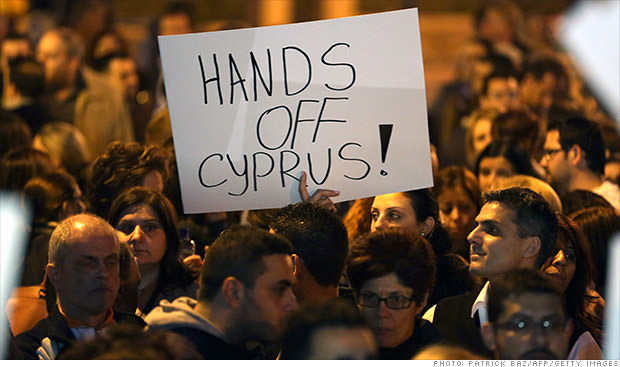What you need to know about Cyprus
How a tiny European country’s financial troubles could affect you
By May Warren, Staff Writer
Maybe you’ve heard of Cyprus at least once. Or maybe you didn’t even know it was in Europe. Either way, you could probably stand to learn more about this mysterious island and why it’s been getting so much attention lately.
1. Where is Cyprus?
The Republic of Cyprus is an island country in the Eastern Mediterranean Sea. It lies east of Greece, south of Turkey and west of Syria and Lebanon and has been divided since 1974. The Greek Cypriot community is a member of the European Union and has been using the Euro since 2008, while the Turkish Cypriots use the lira.
2. Why is everyone talking about it?
The island’s banks held Greek bonds that, in light of Greece’s financial crisis, have devalued and put them on the verge of bankruptcy. An original bailout of 10 billion euros (the equivalent of C$13 billion) was on the table in March, on the condition that Cyprus would also put forth 5.8 billion euros.
The government decided to tax accounts with balances greater than 100,000 euros, approximately $131,000. This “bail-in” plan will give taxed account holders bank shares worth 37.5 per cent of their deposit, but risks them losing the rest of their money.
This month, leaked documents revealed the bailout has risen to 23 billion euros total, with the increase falling on Cyprus’ side of the bill. The country hopes to sell some gold reserves, raise taxes, restructure the banking sector and privatize government industries to pay the 13 billion euros they now owe.[pullquote]This month, leaked documents revealed the bailout has risen to 23 billion euros total, with the increase falling on Cyprus’ side of the bill.[/pullquote]
3. If Cyprus is a small country, how does this affect the rest of the world?
The Cyprus banking sector is about eight times as large as the country’s gross domestic product and the government couldn’t afford a bail out. They’ve now set a precedent of making individual citizens pay to save collapsing financial systems in lieu of the government.
There are fears that Cyprus will face years of recession, yet the government has no plans to leave the Euro. “In no way will we experiment with the future of our country,” President Nicos Anastasiades said. If the euro is affected then so is the European economy, which then endangers the global economy as a whole.
4. Could this ever happen to Canada?
In March, Canadian Finance Minister Jim Flaherty included in his federal budget preparations in case of a Cyprus-style meltdown, including a similar bail-in plan.
“The new rules would allow federal regulators to seize unspecified bank liabilities — including, perhaps, the savings of uninsured depositors — and use them to prop up a faltering institution,” reports the Toronto Star.
Flaherty’s spokespeople have said that savings of less than $100,000, known as insured deposits, would be safe but would not confirm whether mutual funds and savings of over $100,000 would be untouched.
Reassuringly, Canada does have a much stronger economy than Cyprus, but no one expects their banks to collapse until it’s too late.
May Warren is currently completing a Masters of Journalism at Ryerson University in Toronto. She holds a BA from the University of Guelph and an MA from Queens in Political Science. Before going back to school she worked for three years at an international health fund in Geneva, Switzerland. She is particularly interested in international economics reporting.





























Share the post "What you need to know about Cyprus"